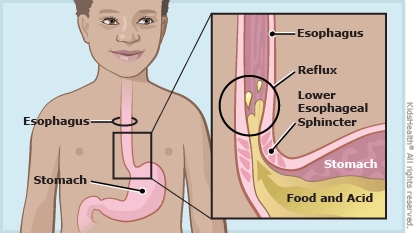Gastroesophageal Reflux (GER) in Kids and Teens
Also called: Gastroesophageal Reflux Disease, GERD, Reflux, Heartburn, Acid Indigestion
What Is Gastroesophageal Reflux (GER)?
Gastroesophageal reflux (GER), or reflux, is when food and acid from the stomach go back up into the esophagus. This is often brief, and people don’t notice it happening. But sometimes it causes an uncomfortable feeling in the chest, neck, and throat, often called heartburn or acid indigestion.
Reflux can happen in adults and kids, even babies. It’s normal and most kids who have gastroesophageal (gass-troh-eh-soff-eh-JEE-el) reflux outgrow it over time. Changes in diet can help, but some kids might need medical treatment.
What Is Gastroesophageal Reflux Disease (GERD)?
Reflux that happens a lot or causes problems like poor growth, vomiting, or damage to the esophagus is called GERD (gastroesophageal reflux disease). GERD is more serious than GER and is sometimes treated with medicine.
What Are the Signs & Symptoms of Gastroesophageal Reflux?
Common signs of reflux in kids include:
- heartburn
- frequent burping or hiccups
- pain or trouble with swallowing
- nausea or vomiting often, especially after meals
- a bad or acid taste in the mouth
- the feeling of stomach acid coming up into the back of the throat
- not wanting to eat or eating only small amounts
Some symptoms may get worse if a child lies down after a meal. It’s OK to have reflux symptoms once in a while. But if they happen a lot, a child could have GERD.
What Causes Gastroesophageal Reflux?
A ring of muscle (the lower esophageal sphincter) separates the esophagus from the stomach. Reflux symptoms happen if this ring relaxes at the wrong time or doesn't close as it should. This lets acidic fluid from the stomach flow backward into the esophagus, into the back of the throat, and sometimes out the mouth or nose.

What Problems Can Happen?
Repeated reflux of stomach acid into the esophagus can lead to:
- breathing problems like choking, wheezing, or asthma
- repeated episodes of pneumonia
- dental cavities (especially in the back teeth), despite good brushing
- redness and irritation in the esophagus, called esophagitis (ih-sah-fuh-JI-tis)
- damage to the esophagus, which can make it hard to swallow
- poor weight gain or losing weight
Kids with developmental or neurological conditions, such as cerebral palsy, are more at risk for reflux and can have more severe, lasting symptoms.
How Is Gastroesophageal Reflux Diagnosed?
To diagnose reflux in kids, doctors usually do an exam and ask about the symptoms. If your child has reflux symptoms, try to keep track of the foods that seem to cause them. This can help the doctor figure out what's going on.
Kids with long-lasting symptoms may need to see a pediatric gastroenterologist (GI). Medical tests might be done in those cases too, such as:
- upper GI radiology study: This special X-ray can show liquid backing into the esophagus, irritation or narrowing of the esophagus, and any upper digestive tract problems.
- upper endoscopy: Doctors look at the esophagus, stomach, and part of the small intestines using a tiny camera. They also may take a small tissue sample (a biopsy) of the lining of the esophagus to rule out or find other problems.
How Is Gastroesophageal Reflux Treated?
Many things can help kids with reflux feel better. Encourage your child to:
- Eat smaller meals more often.
- Avoid foods and drinks that trigger reflux symptoms, such as chocolate; caffeine; fatty, fried, and spicy foods; tomato-based foods and sauces; and peppermint.
- Avoid eating late at night before lying down to sleep.
- Keep a healthy weight (sometime excess weight causes reflux). Your child’s doctor can help you develop a plan.
- Avoid tobacco smoke, which can make reflux worse. Don’t let anyone smoke near your child. If your teen smokes, they should stop.
If your child is older and reflux happens at night, raise the head of their bed 6–8 inches. Reminder: Infants younger than 1 year old, including those with GER, should always sleep on their backs on a flat, firm surface.
If your child takes medicines for other conditions, talk to the doctor or pharmacist about how they take them. For example, stopping some medicines or taking them with food or at different times of day can help.
If symptoms continue, doctors might prescribe medicine, such as:
- antacids you can buy without a prescription: Follow the label directions on how much to give and how often, and talk to your doctor if you give more than a few doses.
- histamine (H2) blockers: These can help block the production of stomach acid.
- proton pump inhibitors: These reduce the amount of acid the stomach makes.
Rarely, medical treatment alone doesn't help enough. Then, a surgical procedure called fundoplication (fun-doh-plih-KAY-shun) might be an option. The surgeon creates a valve at the top of the stomach by wrapping part of the stomach around the esophagus to strengthen the sphincter and prevent reflux. Most kids who need this surgery also have a neurological condition, like cerebral palsy.
When Should I Call the Doctor?
Call your doctor if an older child with GER:
- is very bothered by the reflux
- does not seem to be growing as expected
- coughs, chokes, wheezes, or has trouble breathing
- vomits more than a few times in a 24-hour period
- has blood in the poop
Go to the ER right away if your child has severe chest pain or feels like food has gotten stuck while swallowing.
What Else Should I Know?
Kids with reflux might worry about their symptoms. Reassure them that avoiding the things that trigger symptoms and other simple changes can help them feel better.
